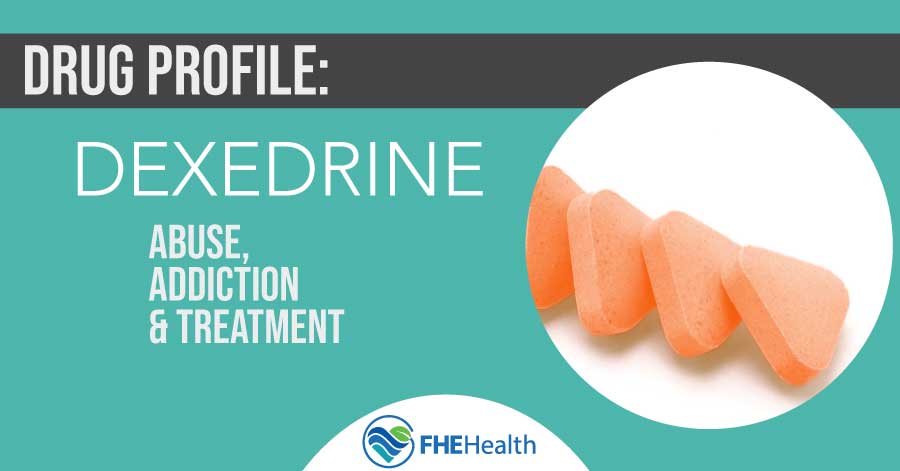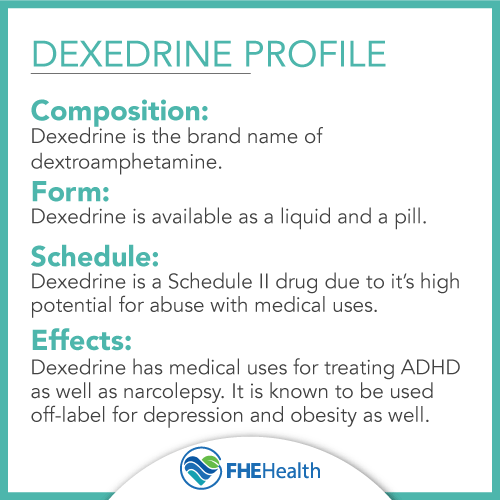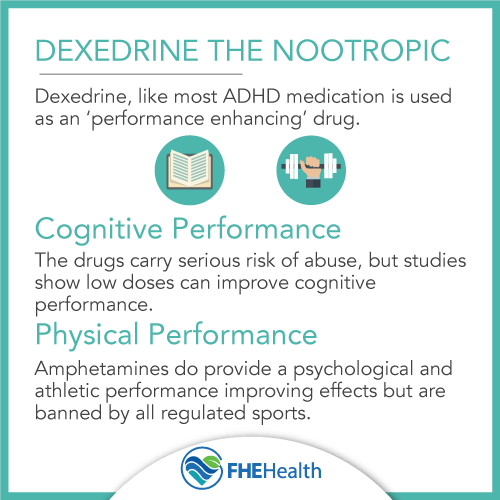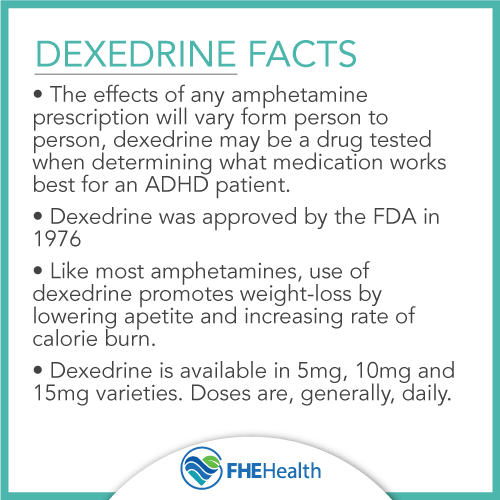
In 1929, Gordon Alles, a biochemist, was actively working on an alternative decongestant when he discovered the first known amphetamine. By 1945, amphetamine tablet sales had reached more than $2 million in revenue, with Dexedrine accounting for $650,000 in sales.
It is widely believed by experts that this time period marked the United States’ first amphetamine epidemic. Throughout the 1950s and 1960s, Dexedrine and variations of the drug were used to treat everything from depression to narcolepsy and weight loss. The U.S. Food and Drug Administration first approved Dexedrine in 1976.
Today, Dexedrine is a Schedule II Controlled Substance, as defined by the Federal Controlled Substance Act of 1970. When misused, the drug can be deadly: it was one of the drugs identified in the “cocktail” that tragically claimed the life of model and reality star Anna Nicole Smith in March 2007.
What is Dexedrine?
 A stimulant medication commonly used to treat attention deficit hyperactivity disorder (ADHD) and narcolepsy, Dexedrine affects the parts of the brain that control impulses. It alters the natural substances in the brain controlled by the central nervous system. Dexedrine is the brand name, but there is also a generic version known as “dextroamphetamine.”
A stimulant medication commonly used to treat attention deficit hyperactivity disorder (ADHD) and narcolepsy, Dexedrine affects the parts of the brain that control impulses. It alters the natural substances in the brain controlled by the central nervous system. Dexedrine is the brand name, but there is also a generic version known as “dextroamphetamine.”
While the drug can be helpful to patients when used as prescribed, it can also cause dangerous side effects and has the potential to become highly addictive. Considered part of the amphetamine group of drugs, Dexedrine is a synthetic, psychoactive drug. Its primary function is to stimulate the central nervous system.
A prescription is required for Dexedrine, as it is a tremendously powerful drug that comes in tablet or liquid form. Common street names for Dexedrine are “dexies,” “co-pilots,” “uppers,” “up,” “speed,” and “footballs,” which refers to the shape of the tablet. Dextroamphetamines have a street value of $5-$10 per tablet.
What Is Dexedrine Used For?
 Prescribed most commonly as a medication to treat ADHD, narcolepsy, and obesity, Dexedrine is a stimulant derived from amphetamines. Doctors who prescribe it must regularly monitor their patients, because they may develop a tolerance or addiction to the drug.
Prescribed most commonly as a medication to treat ADHD, narcolepsy, and obesity, Dexedrine is a stimulant derived from amphetamines. Doctors who prescribe it must regularly monitor their patients, because they may develop a tolerance or addiction to the drug.
If you are prescribed Dexedrine, your doctor will advise you to strictly adhere to the prescribed dosage. Taking higher levels than what you are prescribed results in intense side effects and can easily become habit-forming. Those who are prescribed the drug for a long-term period experience an increased likelihood for misuse and eventual abuse and addiction.
Is Dexedrine Safe?
Dexedrine is known to produce the following effects:
- Restlessness
- Headaches
- Dry mouth
- Difficulty maintaining healthy sleep patterns
- Uncontrollable shaking
- Diarrhea
- Rapid weight loss
- Changes in sex drive
- Constipation
- Unpleasant taste in your mouth
- Fluctuation and loss of appetite
- High blood pressure
Most of these side effects are manageable and not severely harmful; however, Dexedrine users should report all side effects to their doctor. Dangerously high doses or allergies to the drug can cause damaging and even life-threatening side effects such as:
- Increasing heart rate
- Chest pain
- Slow speech
- Seizures
- Dramatic mood swings
- Hallucinations
- Blurred vision
- Shortness of breath
- Aggressive or frenzied behavior
- Paranoia
- Hives
- Abnormal tics
Dexedrine is known to be highly addictive, and those who use it without a prescription or in a way inconsistent with how it was prescribed are engaging in abuse of the drug.
The length of time Dexedrine remains in your body can range from one day to three months, depending on the dosage and your metabolism. The drug is known to remain in urine, blood and saliva for two days, and in hair for up to three months. Several factors, such age, body weight, genetics, and metabolism can influence the length of time that Dexedrine remains in your body.
What is Dexedrine Addiction?
 Since Dexedrine is a Schedule II drug, it has a high potential for abuse, although it is commonly prescribed for medical use. People who begin to abuse Dexedrine are typically trying to achieve a weight loss goal. There is also a fast-growing trend among college students and fast-paced career professionals to use it as a “smart drug.”
Since Dexedrine is a Schedule II drug, it has a high potential for abuse, although it is commonly prescribed for medical use. People who begin to abuse Dexedrine are typically trying to achieve a weight loss goal. There is also a fast-growing trend among college students and fast-paced career professionals to use it as a “smart drug.”
As tolerance is developed and weight loss begins to slow, you may be tempted to increase your dosage to achieve faster results. It is imperative to keep your doses in line with the safe limits prescribed by your doctor. Once your body has developed a tolerance to Dexedrine, ceasing to take it will cause severe withdrawal symptoms. The immediate (but poor) solution to withdrawal symptoms is to take more Dexedrine. This is how addiction begins.
If you or your loved one is addicted to morphine, you may notice some or all of the following common signs:
- Depression
- Hyperactivity
- Irritability
- Lack of impulse control
- Stimulant-induced psychosis
- Violent behavior
- Heart failure
- Seizures
- Suicidal tendencies
If you are a long-term user of Dexedrine, the drug may have already permanently changed the way that your brain works, and you may experience long-term side effects. The best way to prevent further damage from occurring is to seek immediate treatment from certified addiction professionals. They can help you safely detox from the drug and discover a new way to live without Dexedrine as a crutch.
Dexedrine Addiction Treatment
If you have been abusing Dexedrine for more than a few months, you will likely need medical treatment for your addiction. Detoxing from this drug is possible with either a 7-10 day inpatient treatment program, or, for less severe cases, an outpatient program.
The first step in Dexedrine addiction treatment is to detox from the drug. If you choose a medically assisted detox, you will be closely monitored by medical professionals and may receive comfort medications for your withdrawal symptoms, such as:
- An inability to experience happiness
- Anxiety
- Malaise
- Lack of energy
- Irritability
- Intense cravings for the drug
- Inconsistent sleep patterns
Antidepressants, neuroleptics to treat delirium and anti-craving agents are some of the medications that may be employed to help you achieve a safe and complete detox that is as comfortable as possible.
Once detox is complete, behavioral therapies like cognitive behavioral therapy (CBT) can teach you new ways to cope with stress and cravings, so that you don’t revert back to Dexedrine use. Contingency management has also been shown to be an effective ongoing treatment that helps to reprogram the reward center of the brain (where addiction cravings occur).
If you or a loved one suspect that you may be addicted to Dexedrine, don’t be afraid to reach out for help. Contact an FHE addiction counselor today, by calling us at (833) 596-3502. Our compassionate team of counselors are standing by to take your call 24/7. Start your journey to recovery today.






